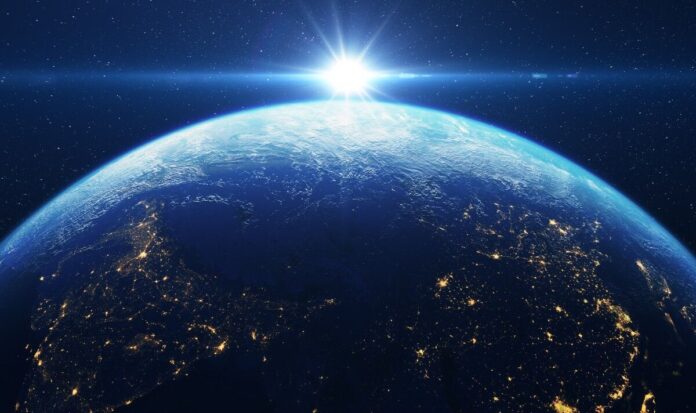The world is rapidly changing – but for today it has almost stood still as the population has officially hit the eight billion mark. According to the United Nations (UN), one billion people have been added to the global population in just 12 years, owing to the “gradual increase in human lifespan owing to improvements in public health”. The ‘major milestone in human development’ was pre-empted to fall this week – but the rapid growth of the world’s human race may be about to slow up due to falling birth rates. The UN said in a statement: ‘This unprecedented growth is due to the gradual increase in human lifespan owing to improvements in public health, nutrition, personal hygiene and medicine. It is also the result of high and persistent levels of fertility in some countries.’At present, data from the World Population Forum shows that China is still the most populous country in the world, with nearly 1.5 billion citizens. India comes second and is set to overtake China very soon. The USA is in third, which hit over 330 millipn people in January 2022. Indonesia is the world’s fourth most populous country, at 280 million people. Next is Pakistan with 230 million, followed by Nigeria with 218 million and then Brazil with 216 million. Bangladesh is the next most populous nation, with nearly 170 million people as of 2022, while Russia follows with nearly 150 million.The tenth most populous nation on Earth is Mexico, with 132 million citzens. Great Britain has a population of over 68 million according to Worldometer – a live tracker which monitors births and deaths.Eight billion is a staggering number of people, and one that may heighten fears over the planet being overcrowded or putting too much pressure on Earth – especially when the climate catastrophe is far from being solved. But despite these concerns – the UN predicts that the world’s population could grow to around 8.5 billion in 2030, only to jump to 9.7 billion in 2050. The global population has hit eight billion (Image: Getty) The population could hit nine billion by 2037 (Image: Getty )The UN also says that more than half the projected increase in population up to 2050 will be concentrated in just eight countries. These include India (which is expected to become the most populous in the coming years), Congo, Ethiopia, Egypt Nigeria, Pakistan, Philippines and Tanzania.But while there are some concerns over the staggering increase in the world’s population, UN Population Fund chief Natalia Kanem says this should not be the greatest concern for the future of the planet.She said: “Some express concerns that our world is overpopulated, I am here to say clearly that the sheer number of human lives is not a cause for fear.”Instead, experts have argued that the bigger threat to humanity with regard to the alarming rate of global warming as a result of greenhouse gas emissions is linked to income levels as opposed to population distribution. Raya Muttarak, a Professor of Demography at the University of Bologna, told Euro News: “The top 10 percent, in terms of net wealth, is actually responsible for about 50% of the greenhouse gas emissions. And they only account for 770 million persons in the world. Whereas the bottom 50 percent, which roughly accounts for 4 billion people in the world, only emit 12 percent.”READ MORE: Metal detectorists’ possible treasures ‘worth thousands’ go missing India is set to overtake China as the most populous country next year (Image: Getty )Since 2011, India has seen around 180 million people added to its population, and is set to overtake China as the world’s most populous country as early as next year.According to the UN’s projections, the global population will peak at around 10.4 billion people in the 2080s and remain at that level until 2100.While the population is expected to keep on growing for the foreseeable future, the world’s richest man and Tesla CEO Elon Musk has regularly put out the view that there will be population collapse due to low birth rates. He has previously tweeted: “Population collapse due to low birth rates is a much bigger risk to civilization than global warming.”DON’T MISS Sturgeon’s Indyref dream dealt another blow as Scots back UK [REPORT] Germany sends Putin huge warning and unveils new ‘panther’ tank [REVEAL] Ukraine sent US air defence systems to annihilate Putin’s missiles [INSIGHT] Musk has claimed that the population could collapse (Image: Getty ) The UN Secretary General said this is an “occasion to celebrate diversity” (Image: Getty )But demographers’ predictions are completely at odds with the multibillionaire’s views. Tomas Sobotka, from the Vienna Institute of Demography, said: ‘With 8 billion people and counting on the earth, we don’t see a collapse happening at present time, and it’s not even projected.”However, Mr Musk is right to say that birth rates are decreasing, with the growth rate having fallen steadily to less than 1 percent per year. But this will only keep the world’s population form reaching 9 billion people until 2037, according to projections. UN Secretary-General Antonio Guterres said in the UN’s statement that the global population hitting eight billion people should be ‘an occasion to celebrate diversity and advancements while considering humanity’s shared responsibility for the planet.’
World hits 8bn people as countries with biggest populations unveiled
Sourceexpress.co.uk
RELATED ARTICLES


